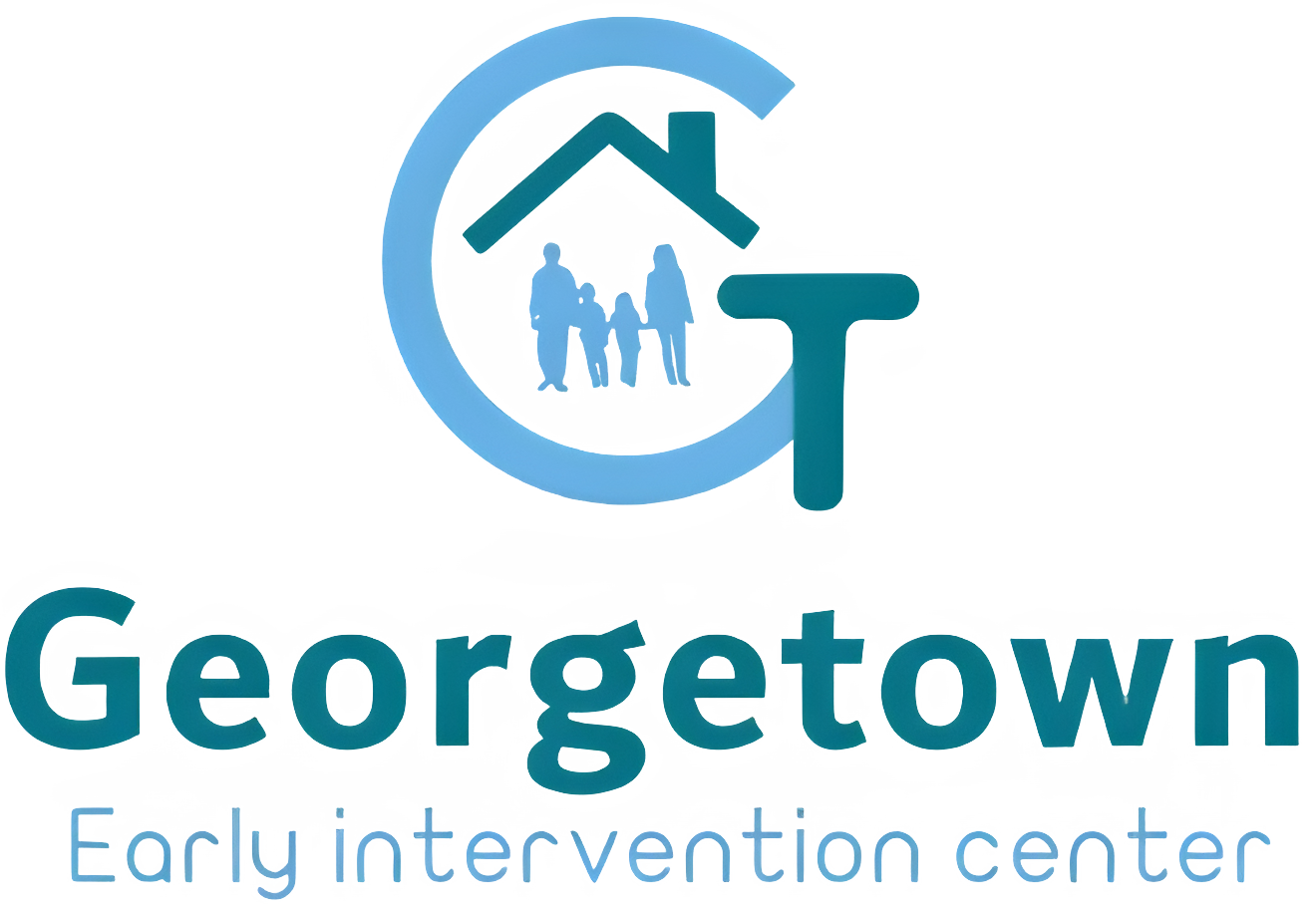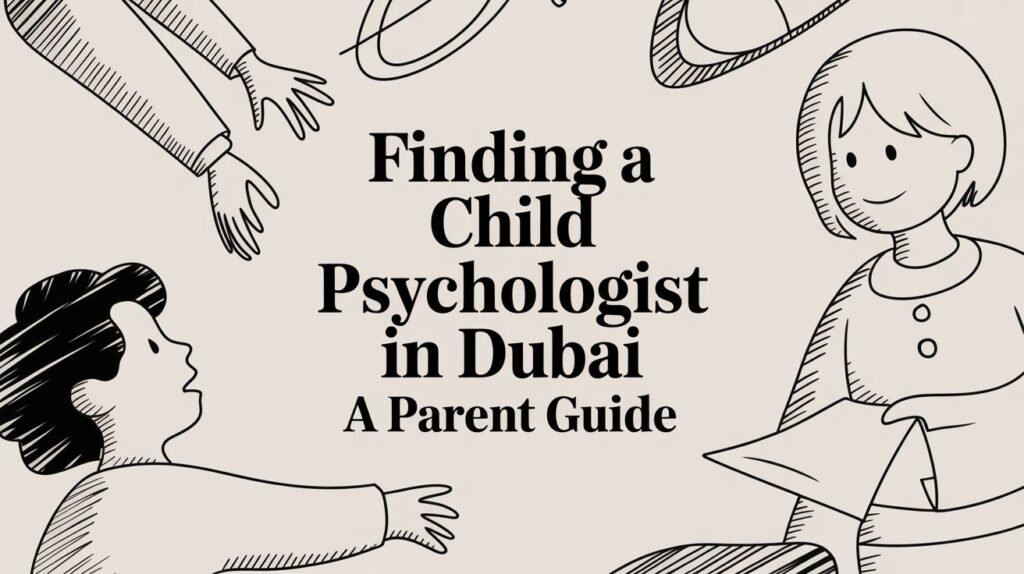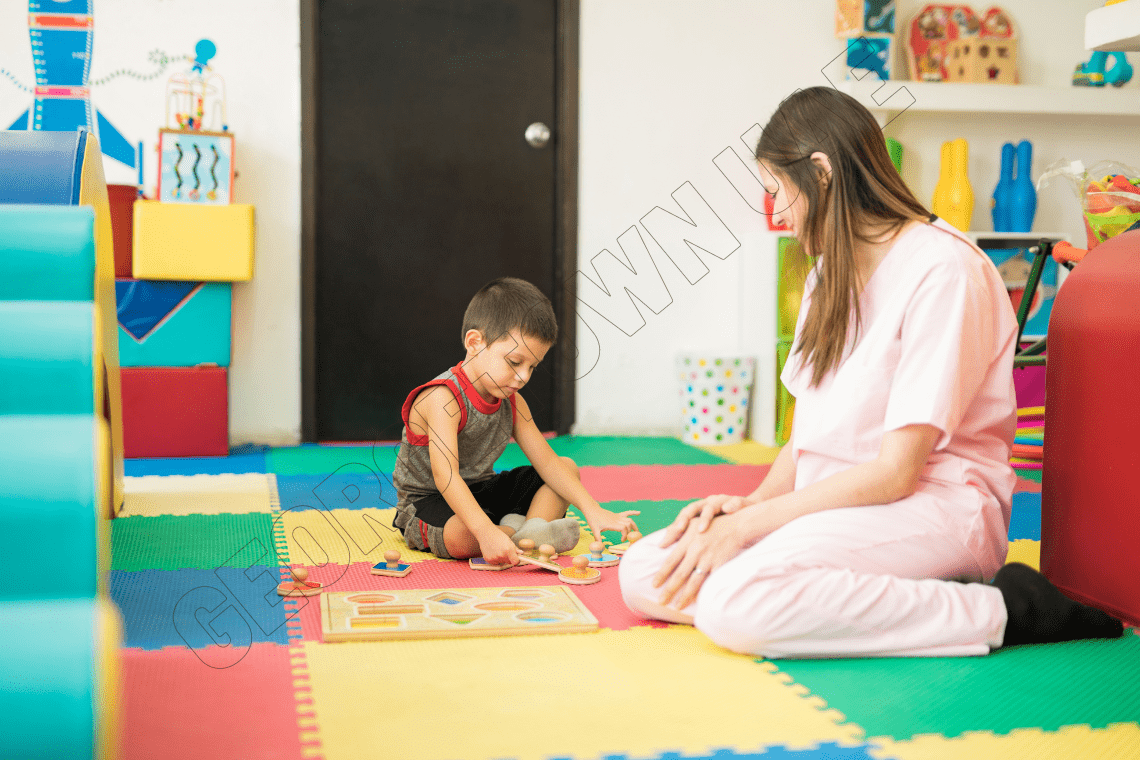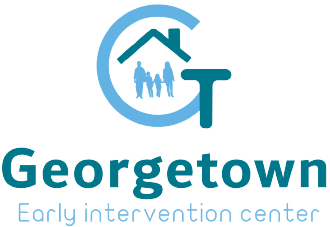Finding the right child psychologist in Dubai can feel like a huge undertaking, but you’re definitely not alone on this journey. This guide is designed to give you a clear, reassuring roadmap, cutting through the confusion and giving you the confidence to make the best decisions for your family.
Why Seeing a Child Psychologist Is a Proactive Step
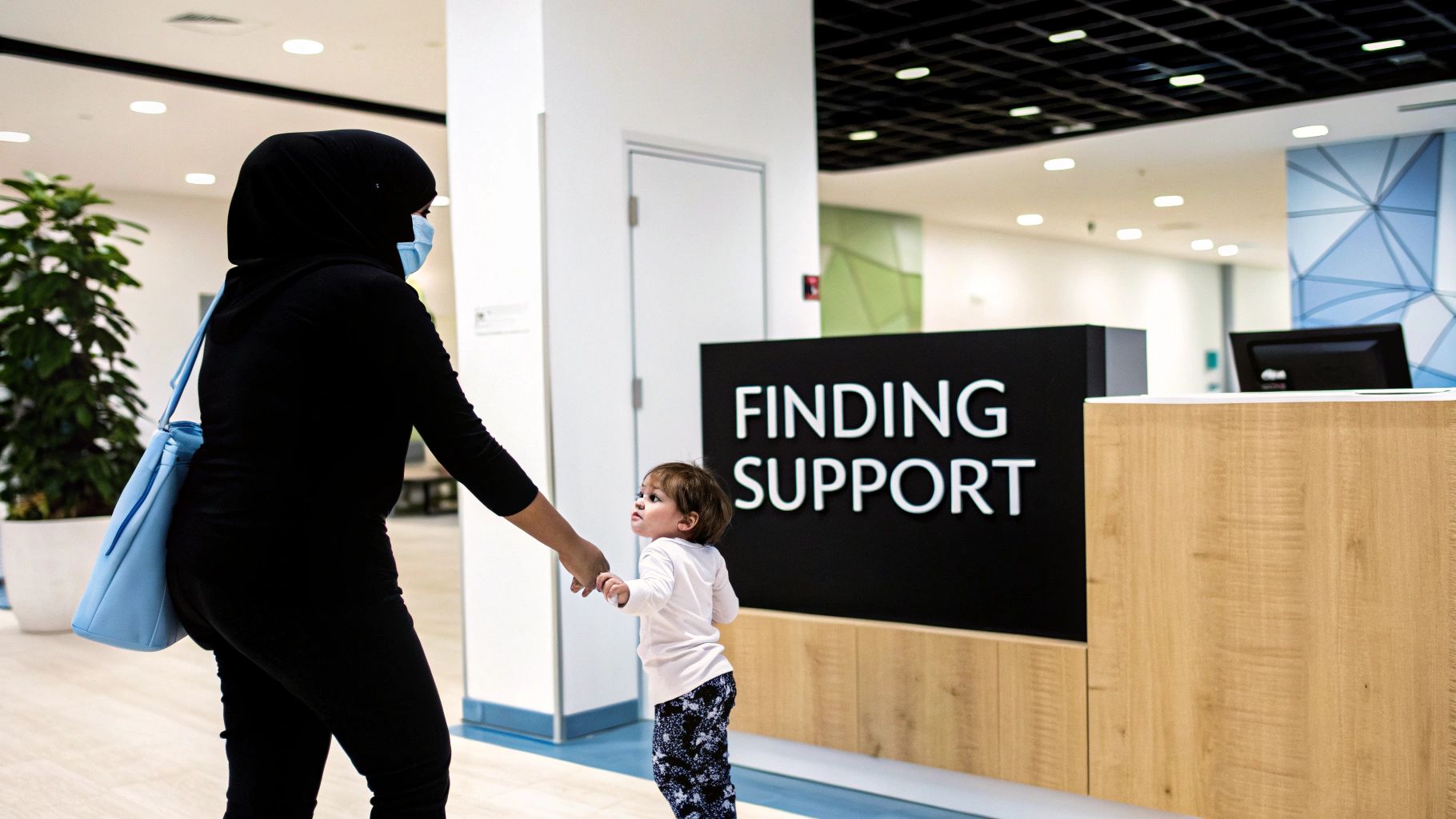
Deciding to get support for your child is a powerful act of love. It’s helpful to think of a child psychologist not as a sign of a problem, but as a specialized coach for your child’s inner world—a "feelings coach" who helps them make sense of their emotions and thoughts.
Taking this step early on is key. It helps build resilience, teaches healthy ways to cope with life's ups and downs, and gives your child the tools they need to flourish. You're addressing small bumps in the road before they turn into major roadblocks, creating a solid foundation for their future well-being.
Dubai's Growing Support Network
The good news is that the support network for families here is getting stronger all the time. Dubai has made a significant push to enhance mental health services for children and teens. Government initiatives through Emirates Health Services (EHS) have built a solid network of clinics at places like Al Amal Psychiatric Hospital, where multidisciplinary expert teams are ready to help.
These centers offer a full spectrum of care, from initial outpatient assessments to specialized rehabilitation, making sure every child gets the right kind of support. This growth means parents have more choices and better access to qualified professionals than ever before, offering real peace of mind.
A child’s mental health is just as important as their physical health. Providing them with professional support is one of the greatest investments you can make in their long-term happiness and success.
The process involves figuring out different therapy styles, knowing what qualifications matter, and, most importantly, finding a psychologist who really clicks with your child's personality. Whether you're just looking for some guidance or need to find the best psychologist in Dubai for broader adult or family needs, this guide will help you move forward with clarity.
Recognizing When Your Child Might Need Support
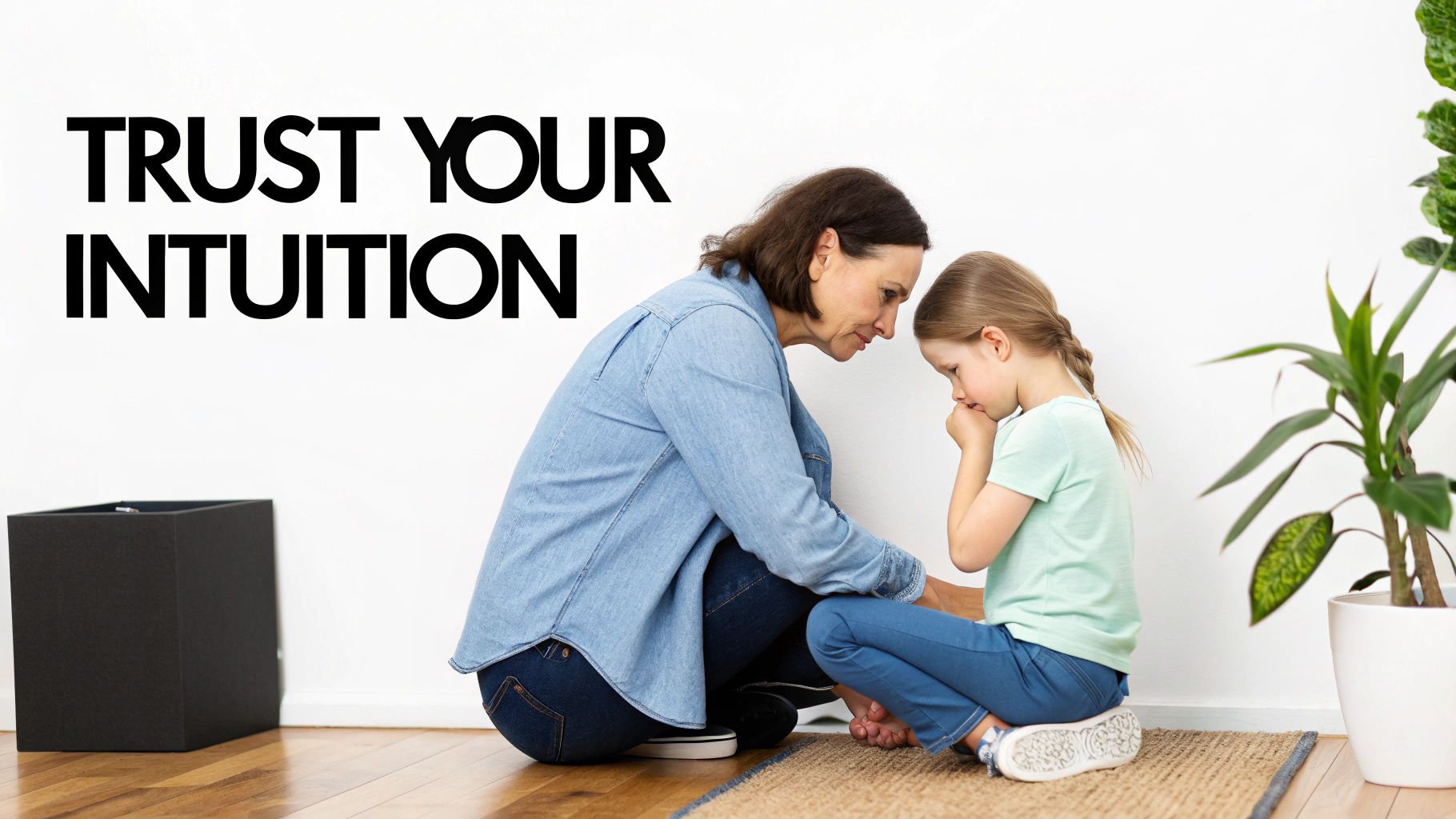
As a parent, you have an intuition—a gut feeling—about your child’s well-being that no one else does. Sometimes, that feeling quietly suggests that something is off, even if you can’t quite name it. Learning to trust that instinct is the first, most important step toward getting your child the right support.
This isn't about jumping to conclusions or looking for a diagnosis. It’s simply about noticing patterns that hint your child might be struggling to cope with their world. Think of these signs as gentle flags, indicating that a professional consultation could offer valuable guidance. Reaching out to a child psychologist in Dubai is a proactive and loving way to support their emotional health.
Here’s a simple way to look at it: if your child had a cough that just wouldn’t go away, you’d see a doctor. Persistent emotional or behavioral struggles deserve that same level of care and attention.
Common Signs by Age Group That May Warrant a Consultation
To help you get a clearer picture, this table breaks down some common behavioral and emotional flags by age. It's not a diagnostic tool, but rather a guide to help you spot patterns that might be worth discussing with a professional.
| Age Group | Potential Emotional & Social Signs | Potential Behavioural Signs |
|---|---|---|
| Toddlers (1-3 years) | Extreme separation anxiety; unusually withdrawn or fearful; lack of interest in play. | Very frequent, intense tantrums; self-harming behaviours (e.g., head-banging); significant sleep disturbances. |
| Preschoolers (3-5 years) | Persistent sadness or irritability; intense, specific fears or worries; difficulty playing with other children. | Aggressive behaviour (hitting, biting); sudden regression (e.g., bedwetting); dramatic changes in eating habits. |
| School-Aged (6-12 years) | Overwhelming worries about school or friends; frequent complaints of physical pain (headaches, stomachaches) with no medical cause; sudden loss of confidence. | A sharp drop in grades; withdrawal from friends and hobbies; difficulty concentrating; defiance or hostility at home or school. |
| Teenagers (13-18 years) | Pervasive sadness or hopelessness; loss of interest in activities they once enjoyed; talk of self-harm; extreme mood swings. | Significant changes in sleeping or eating patterns; substance use; risky behaviours; avoiding social situations. |
Remember, all children experience some of these behaviours from time to time. The key is to look for signs that are persistent, severe, or represent a significant change from your child’s usual self.
Life Transitions and Environmental Stressors
Big life changes can throw a child’s world off-kilter, and their behavior often reflects that inner turmoil. A move to a new country—especially to a dynamic, bustling hub like Dubai—is a massive adjustment.
Other events like changing schools, the arrival of a new sibling, or conflict within the family can also be major stressors that disrupt a child's sense of security. While many kids are resilient and adapt over time, some may need a little extra help processing these big feelings and navigating the change. Being aware of the specific signs of anxiety and depression in children and teens can make all the difference.
Trusting your gut is one of the most important things you can do as a parent. If you feel something is amiss with your child’s emotional health, it’s always worth exploring with a professional.
Ultimately, understanding how clinical psychology helps children can demystify the process and empower you to take the next step. You are your child’s greatest advocate. Simply noticing they might need support is the first and most crucial part of their journey toward well-being.
How to Find the Right Child Psychologist in Dubai

Starting this journey for your child can feel overwhelming, and finding the right professional is a huge part of that. Think of it like looking for a trusted guide—you need someone with the right map and skills, but just as importantly, someone who makes your child feel safe and truly heard. This decision is about so much more than qualifications; it’s about finding a genuine connection.
Your mission is to find a qualified child psychologist in Dubai who not only has the right credentials but also clicks with your family’s values and your child’s unique personality.
Start with Credentials and Licensing
First things first: licensing. In Dubai, mental health professionals must be legally licensed to practice. This isn't just a formality—it’s your assurance that a psychologist meets the emirate’s strict standards for education, training, and ethical practice. It's the most critical checkpoint.
Keep an eye out for professionals licensed by these key authorities:
- Dubai Health Authority (DHA): This is the main regulatory body for all healthcare professionals in Dubai.
- Community Development Authority (CDA): This authority licenses social care professionals, which includes some psychologists.
These credentials confirm a therapist has the necessary expertise. Most reputable clinics display this on their websites, but if you don't see it, don't hesitate to ask them directly. It’s your right to know.
The UAE is also strengthening its own base in child psychology. A 2025 global university ranking looked at 13 UAE institutions, highlighting over 3,000 academic papers and 55,000 citations in the field. While this shows a growing academic foundation, Dubai’s diverse community also attracts highly qualified psychologists from around the world.
Where to Begin Your Search
Knowing where to look can make the process feel much more manageable. Instead of getting lost in a sea of online search results, it’s often best to start with trusted sources right in your own community.
Here are a few great starting points:
- School Referrals: Your child's school counselor or even a trusted teacher is a fantastic resource. They often have a list of local psychologists they’ve worked with and can offer insights based on firsthand experience.
- Pediatrician or GP Recommendations: Your family doctor is another excellent person to ask for a referral to a reputable mental health specialist.
- Accredited Clinics and Centers: Look for established centers that are well-known for their child and family services. These places often have multidisciplinary teams, which can be a huge advantage. For instance, you might find that an educational psychologist in Dubai is a perfect fit for your child's needs.
The "best" psychologist isn't the one with the longest list of accolades. It’s the one who creates a space where your child feels seen, heard, and genuinely supported.
Questions to Ask During Your First Consultation
Think of the initial consultation as an interview—you’re feeling them out, and they’re getting to know you. It's absolutely a two-way street. Before you even walk in, it helps to have a clear idea of what you’re looking for by understanding what makes a good child psychologist.
Come to the meeting prepared with a few questions to guide the conversation:
- What’s your experience working with children who have challenges similar to my child’s?
- Which therapeutic approaches do you use (like Play Therapy or CBT), and why do you prefer them?
- How do you involve parents in the therapy process?
- For a child my child’s age, what does a typical session look like?
- How will we work together to set goals and track progress?
Finding the right person can take time, so be patient and trust your gut. That connection between your child and their psychologist is truly the foundation for healing and growth.
Understanding Different Therapy Approaches for Children
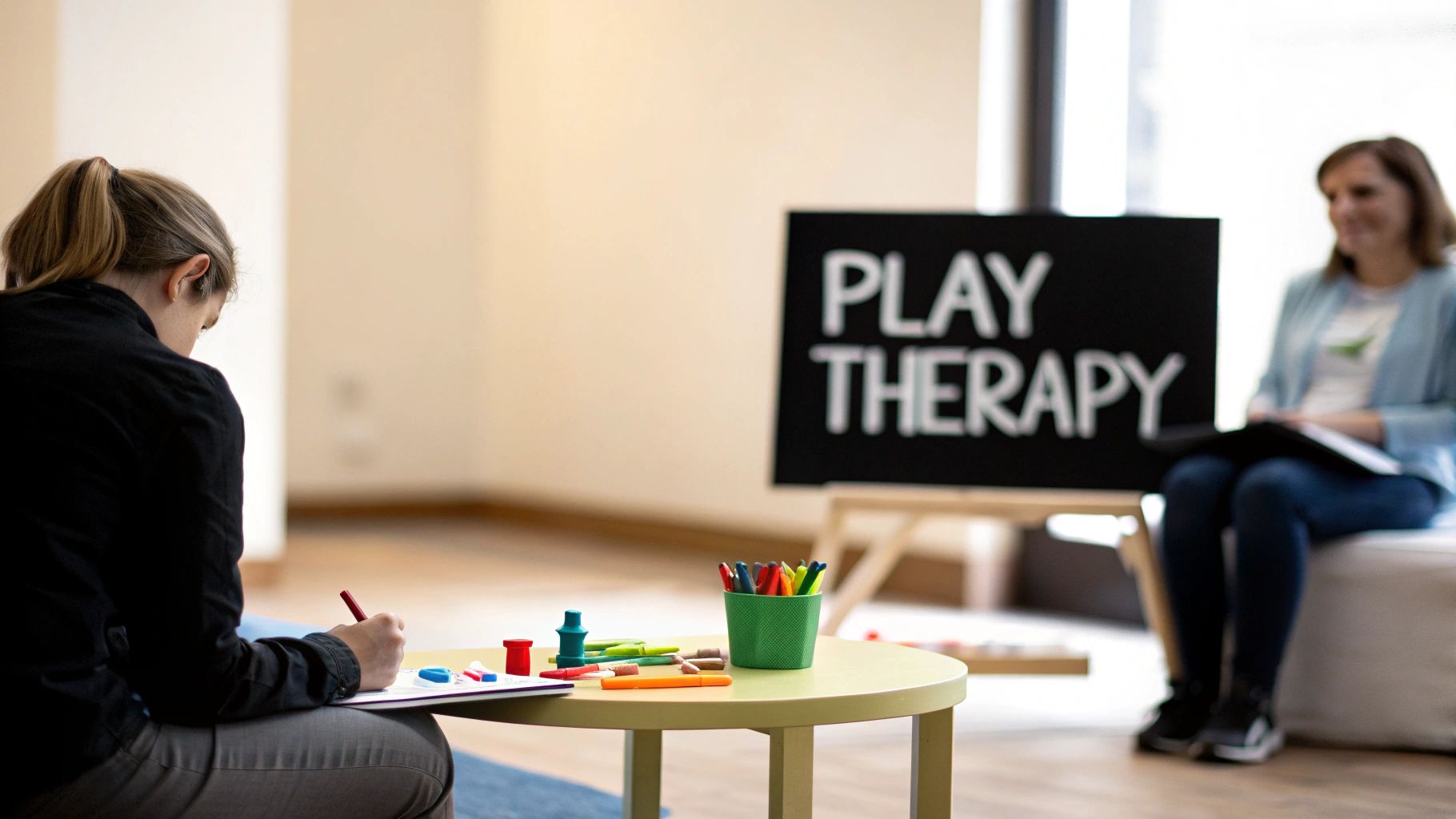
The idea of therapy can feel a bit abstract, especially when it’s for your child. What really happens in a session? Forget the old image of a child lying on a couch. Modern child psychology is dynamic, creative, and built around how children actually learn and express themselves.
A skilled child psychologist in Dubai has a whole toolkit of methods designed to meet your child right where they are. These approaches aren’t one-size-fits-all. They are carefully chosen based on your child’s age, personality, and the specific hurdles they’re facing, making sure the experience is both comfortable and truly effective.
Play Therapy: The Language of Children
For young children, play isn't just for fun—it's their most natural form of communication. Play Therapy taps into this instinct to help them explore feelings they might not have the words for yet. Think of the therapy room as a safe space where a child can use dolls, art supplies, or building blocks to act out their worries.
For instance, a child dealing with family conflict might use puppets to tell a story about an angry lion and a scared rabbit. This opens a door for the therapist to gently explore these feelings without asking direct, intimidating questions. It's a powerful way for kids to process big emotions through action, not just words.
Cognitive Behavioural Therapy (CBT) For Kids
As children grow, Cognitive Behavioural Therapy (CBT) becomes an incredibly useful tool. At its heart, CBT helps kids see the link between their thoughts, their feelings, and their actions. It’s like teaching them to become a detective of their own mind.
Imagine your child has "villain worries"—those automatic negative thoughts like, "No one will play with me at school." CBT gives them the superpower to challenge that thought and reframe it into a more realistic "superhero thought," like, "I can ask someone to play, and they might say yes." It’s an approach that equips them with practical, lifelong skills for managing anxiety and building self-confidence.
Therapy for children is about giving them a toolbox of emotional skills. Each technique—whether it's through play, conversation, or family collaboration—is a different tool designed to help them build resilience and understanding.
Family Systems Therapy: A Team Approach
Sometimes, the best way to support a child is to work with the whole family. Family Systems Therapy is built on the idea that a family is an interconnected team. When one person is struggling, it impacts everyone, and small changes in the family dynamic can create big, positive shifts for the child.
This approach isn't about pointing fingers or placing blame. Instead, the focus is on improving communication, understanding different family roles, and solving problems together. The psychologist acts like a coach, helping the entire family learn new ways to support one another and function as a stronger, more connected unit.
Navigating Costs, Insurance, and Other Hurdles
Deciding to get professional support for your child is a huge step, and it's totally normal for practical questions about costs, insurance, and scheduling to pop up right away. Let's walk through these common concerns, because having a clear picture can make the whole process feel much more manageable.
For most families, the financial side of things is the first big question. Seeking help from a private child psychologist in Dubai is an investment in your child's future, but it's important to know what to expect.
Understanding Session Costs and Insurance
In Dubai, the cost for a therapy session can vary quite a bit. It often depends on the centre's reputation, the psychologist's level of experience, and how long the session is. As a general guide, you can expect fees to range anywhere from AED 500 to over AED 1,000 per session.
The good news is that insurance coverage for mental health is getting better in the UAE, but it’s not always a straight line. Before you book anything, it's a smart move to get clear on your policy.
- Dig into Your Policy: Scan your insurance documents for keywords like "mental health," "psychological services," or "behavioural therapy."
- Call Your Provider: Get on the phone with your insurance company and ask direct questions. Try something like, "Are services from a licensed child psychologist covered?" or "Is there a cap on the number of sessions we can have?"
- Lean on the Clinic: Most reputable centres have admin staff who deal with insurance companies all the time. They can be a great resource for helping you figure out what your plan covers.
Finding a path forward often means acknowledging the challenges first. Financial and social hurdles are real, but they don't have to be roadblocks. With the right information, you can find a solution that works for your family.
Overcoming Other Common Obstacles
Beyond the money, other challenges can feel just as big. Research from the UAE backs this up, showing that 52.7% of families faced barriers when trying to get care for their children, with 63.2% pointing to financial hardship as a major issue. These struggles were often made tougher by a lack of family support, a reality for 68.5% of caregivers. You can discover more insights about these regional challenges from the full study.
This data just confirms what so many parents feel—you are definitely not alone in this. Other hurdles you might encounter include:
- Social Stigma: Conversations around mental health are opening up, but some families still worry about what others might think. Remember, getting help for your child is a sign of incredible strength and love.
- Scheduling Conflicts: Dubai's fast-paced lifestyle doesn't always make it easy to fit in appointments. It's worth looking for centres that offer evening or weekend hours to better match a busy family's schedule.
- Family Hesitation: It's not uncommon for a partner, grandparent, or other family member to be a bit skeptical. The best approach is one of empathy. Share your concerns calmly and frame therapy as a way to equip your child with valuable life skills. Sometimes, starting with a school counsellor can feel like a gentler, more accessible first step for everyone.
Common Questions About Child Psychology in Dubai
Deciding to start this journey with your child is a big step, and it’s completely natural to have questions. Getting clear, straightforward answers can take a lot of the mystery out of the process and give you the confidence to move forward. Here, we’ll tackle some of the most common practical questions parents ask when looking for a child psychologist in Dubai.
Knowing what to expect can make the whole experience feel much less intimidating for both you and your family. It’s all about arming you with the right information.
How Long Does Child Therapy Usually Take?
This is easily one of the first questions on every parent's mind, and the most honest answer is: it really depends. There's no magic number of sessions that works for everyone because every child's path is unique. It’s less like a fixed prescription and more like personal training for their emotional wellbeing—how long it takes depends on where they're starting from and what they hope to achieve.
For a child dealing with a specific, short-term issue like adjusting to a new school, therapy might only last a few months. But for those facing more complex challenges, like a developmental disorder or significant anxiety, the support might be more of a long-term partnership.
A good psychologist will sit down with you right from the start to set clear, realistic goals. They’ll also check in with you regularly to discuss your child's progress, making sure you’re always part of the conversation about how long therapy should continue.
Will I Be Involved in My Child's Therapy Sessions?
Absolutely. In fact, your involvement is one of the biggest predictors of success. A common myth is that you just drop your child off for an hour and come back when it’s over. The reality is that effective child therapy is a team effort between the child, the parents, and the psychologist.
Now, what your involvement looks like can change depending on your child’s age and the type of therapy.
- For Younger Children: You’ll likely be right there in the sessions, especially for family-focused therapies or when you're learning new ways to support your child at home.
- For Older Children and Teens: It’s crucial for the psychologist to build a trusting, confidential space with your child. But you won't be left in the dark. You'll have regular parent-only meetings to discuss progress and strategies, all while respecting your child's privacy.
Parental engagement is the bridge that connects the progress made in the therapy room with daily life at home. Your support and reinforcement of new skills are essential for lasting positive change.
This partnership ensures that the skills your child is learning in their sessions are actually being practiced and supported in their day-to-day world.
Is Online Therapy Effective for Children?
In a city as busy as Dubai, the convenience of online therapy—or teletherapy—is a game-changer for many families. It has turned out to be a surprisingly effective option for lots of kids, particularly older children and teens who are already pros at digital communication.
Methods like Cognitive Behavioral Therapy (CBT) translate very well to a virtual setting. On the other hand, for very young children or for therapies that are hands-on, like Play Therapy, being in the room together is usually better. The best way to know for sure is to chat about it with a potential child psychologist in Dubai. They can look at your child’s specific needs and personality to figure out if online sessions would be a good fit.
What Is the Difference Between a School Counselor and a Psychologist?
It helps to think of school counselors and clinical psychologists as different specialists on the same team, both there to support your child. They both play vital roles, but they have different areas of focus and training.
A school counselor is an amazing, on-the-ground resource right there in the school. Their main job is to help students with school-related challenges—things like academic struggles, making friends, peer conflicts, and milder emotional bumps in the road that pop up during the day.
A clinical child psychologist, however, is a licensed healthcare professional with deep, specialized training to diagnose and treat a much wider and more complex range of mental health conditions. They work on deep-seated emotional issues, behavioral disorders, and significant developmental challenges that need more intensive intervention than a school can typically offer. Often, they work together, with the counselor helping to reinforce the strategies at school that are being developed in therapy.
